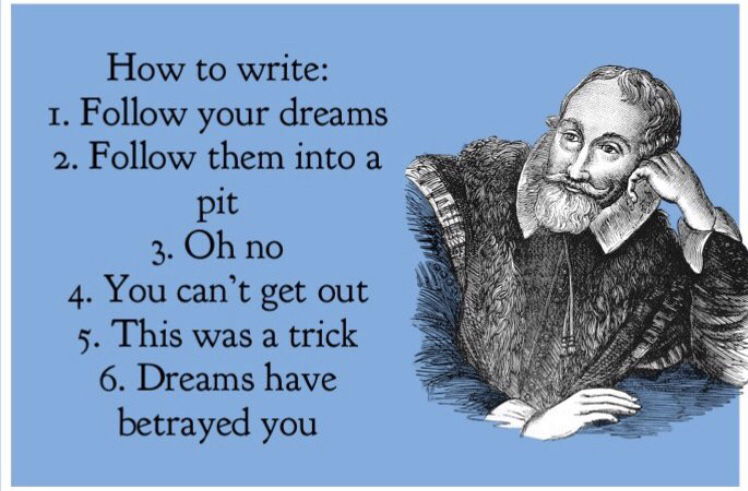8 Brain Hacks to be a Happier Writer
Anyone who's ever tried to write knows that it's hard.
Really hard.
There's the whole staring-at-a-blank-page thing. There's the endless Internet distractions and other procrastination-inducers. Brilliant shower ideas that disappear by the time you dry off and get a pen to paper. Friends and family who might not believe in you or support you, who resent the time you spend pursuing your dream. Self-doubt, self-criticism, lack of time, lack of money, endless interruptions, writer's block, overwhelm. Just to name a few of the challenges.

And if you manage to push though all of the above and create a polished product, you get to to move on to the rejection stage of the game! Rejection is inevitable on writer's journey. I'm sure you've heard the famous ones--J.K. Rowling's twelve rejections before Harry Potter was published, Dr. Seuss's twenty seven rejections, Stephen King's thirty rejections. The industry has gotten even more competitive since these writers started out and now it's not uncommon for authors to rack up HUNDREDS of rejections (with re-writes in-between) before finally getting a break.
At one point when I was in the thick of the struggle, I saw this meme on social media and I laughed until I cried because it was just TOO true.

Everyone says you have to have a thick skin and be persistent... but no one tells you how. Getting rejected hurts!
Luckily, science has some advice on how to stay out of the pit of despair--by maximizing your happiness hormones.
Here are eight tips on how to keep those feel-good chemicals flowing through all the ups and downs.
Dive into Dopamine
Dopamine is known as the reward chemical. With a high level of dopamine inside your brain, you tend to be more productive, work harder and believe that you’re going to achieve your goals.
Hack #1. Set small, achievable goals and celebrate each time you reach one. And when I say small and achievable, I mean small and achievable. Start by coming up with something realistic... then scale it back. Way back. This way, you'll be sure to reach your goal and reap the dopamine rewards, which will likely keeping you moving and writing even more.
Hack #2. Keep a "complements journal." Each time someone praises your work, write it down in a dedicated journal. This will help the complements "stick" and you'll feel the dopamine surge a second time as you write it down. When you need help bouncing back from rejection or criticism, read the journal as a pick-me-up.

Offer up Some Oxytocin
Oxytocin is known as the love hormone. You can get it by playing with a dog, connecting with a friend or giving a compliment. Helping others triggers oxytocin, which not only boosts your mood but also counteracts the effects of cortisol (the evil stress hormone). Interestingly, the higher your levels of oxytocin, the more you want to help others. Bonus: when oxytocin is boosted, so are serotonin and dopamine!
Hack #3. Join a critique group. Not only will you get the feels as you help your fellow writers improve their work, you'll also get the benefit of valuable feedback which will go a long way toward improving your own work.
Hack #4. Take the time to tell others writers when you like or love their work-- make a habit of posting positive reviews of books or films you've enjoyed. Get specific with your complements and know that your words might very well make someone's day.

Stock up on Serotonin
Serotonin is a mood stabilizer. We can get it from exposure to sunlight and meditation.
Hack #5. Take outdoor 'troubleshooting' breaks. As you step away to think on a story problem, the serotonin that's released will help to improve your mood and boost your productivity.
Hack #6. Take a creative nap. Close your eyes and take a short daytime nap with the intention of dreaming about your story or character. This will increase your energy levels and may also help you connect with your subconscious (where the solutions to those troublesome plot holes might be hiding.)

Enhance Endorphins
Endorphins are known as the pain killing chemical because they release a brief sense of euphoria that masks physical pain. Laughter and exercise are two simple ways of increasing your endorphins, which have been linked to relieving the effects of anxiety and depression.
Hack #7. Take exercise breaks. Walk around the block, do some jumping jacks or push ups. Along with the increase of serotonin you'll also get blood flowing to the ol' noggin, making for clearer thinking. And clearer thinking of course translates to better writing.
Hack #8. Try adding some comedy to whatever it is you're working on. Even if it doesn't end up in the final draft, if you can make yourself laugh, you’ll be activating a good dose of endorphins which can help you stay motivated.

So, there you have it. Now you have no excuse to be a miserable writer. Put on your happy pants and get to work!
(Note: This is not intended as medical advice--if you are truly struggling, please reach out to a mental health professional. This blog was adapted from/inspired by a post by Clare Helen Welsh on The Picture Book Den.)